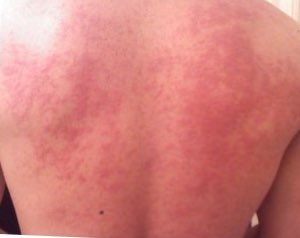Soy allergy
Editor-In-Chief: Prab R Tumpati, MD
Obesity, Sleep & Internal medicine
Founder, WikiMD Wellnesspedia &
W8MD medical weight loss NYC and sleep center NYC
| Soy allergy | |
|---|---|

| |
| Synonyms | N/A |
| Pronounce | N/A |
| Specialty | N/A |
| Symptoms | Hives, itching, swelling, abdominal pain, diarrhea, nausea, anaphylaxis |
| Complications | N/A |
| Onset | Minutes to hours after exposure |
| Duration | Variable, can be chronic with repeated exposure |
| Types | N/A |
| Causes | Immune system reaction to soy protein |
| Risks | Family history of allergies, atopic dermatitis |
| Diagnosis | Skin prick test, blood test for IgE antibodies |
| Differential diagnosis | Lactose intolerance, celiac disease, other food allergies |
| Prevention | Avoidance of soy-containing products |
| Treatment | Antihistamines, epinephrine for severe reactions |
| Medication | N/A |
| Prognosis | N/A |
| Frequency | Estimated 0.4% of children, less common in adults |
| Deaths | N/A |
Soy Allergy is a type of food allergy that is triggered by the consumption of soy products. It is one of the more common food allergies, especially among babies and children.
Symptoms[edit | edit source]
The symptoms of a soy allergy can range from mild to severe and can include:
- Hives or skin rash
- Itching in the mouth
- Difficulty breathing
- Abdominal pain
- Diarrhea
- Nausea or vomiting
- Dizziness
- Anaphylaxis
Causes[edit | edit source]
A soy allergy occurs when the body's immune system mistakenly identifies soy as harmful and creates antibodies against it. When soy is consumed, the immune system releases chemicals such as histamine, which cause allergy symptoms.
Diagnosis[edit | edit source]
A soy allergy is typically diagnosed through a combination of a patient history, skin prick test, and blood test. In some cases, an oral food challenge may be conducted under medical supervision.
Treatment[edit | edit source]
The primary treatment for a soy allergy is avoidance of soy products. This can be challenging, as soy is found in many processed foods. In cases of accidental ingestion, antihistamines may be used to relieve symptoms. In severe cases, such as anaphylaxis, emergency treatment with epinephrine is required.
Additional images[edit | edit source]
See Also[edit | edit source]
Transform your life with W8MD's budget GLP1 injections from $125
W8MD offers a medical weight loss program NYC and a clinic to lose weight in Philadelphia. Our W8MD's physician supervised medical weight loss centers in NYC provides expert medical guidance, and offers telemedicine options for convenience.
Why choose W8MD?
- Comprehensive care with FDA-approved weight loss medications including:
- loss injections in NYC both generic and brand names:
- weight loss medications including Phentermine, Qsymia, Diethylpropion etc.
- Accept most insurances for visits or discounted self pay cost.
- Generic weight loss injections starting from just $125.00 for the starting dose
- In person weight loss NYC and telemedicine medical weight loss options in New York city available
- Budget GLP1 weight loss injections in NYC starting from $125.00 biweekly with insurance!
Book Your Appointment
Start your NYC weight loss journey today at our NYC medical weight loss, and Philadelphia medical weight loss Call (718)946-5500 for NY and 215 676 2334 for PA
Search WikiMD
Ad.Tired of being Overweight? Try W8MD's NYC physician weight loss.
Semaglutide (Ozempic / Wegovy and Tirzepatide (Mounjaro / Zepbound) available. Call 718 946 5500.
Advertise on WikiMD
|
WikiMD's Wellness Encyclopedia |
| Let Food Be Thy Medicine Medicine Thy Food - Hippocrates |
Translate this page: - East Asian
中文,
日本,
한국어,
South Asian
हिन्दी,
தமிழ்,
తెలుగు,
Urdu,
ಕನ್ನಡ,
Southeast Asian
Indonesian,
Vietnamese,
Thai,
မြန်မာဘာသာ,
বাংলা
European
español,
Deutsch,
français,
Greek,
português do Brasil,
polski,
română,
русский,
Nederlands,
norsk,
svenska,
suomi,
Italian
Middle Eastern & African
عربى,
Turkish,
Persian,
Hebrew,
Afrikaans,
isiZulu,
Kiswahili,
Other
Bulgarian,
Hungarian,
Czech,
Swedish,
മലയാളം,
मराठी,
ਪੰਜਾਬੀ,
ગુજરાતી,
Portuguese,
Ukrainian
Medical Disclaimer: WikiMD is not a substitute for professional medical advice. The information on WikiMD is provided as an information resource only, may be incorrect, outdated or misleading, and is not to be used or relied on for any diagnostic or treatment purposes. Please consult your health care provider before making any healthcare decisions or for guidance about a specific medical condition. WikiMD expressly disclaims responsibility, and shall have no liability, for any damages, loss, injury, or liability whatsoever suffered as a result of your reliance on the information contained in this site. By visiting this site you agree to the foregoing terms and conditions, which may from time to time be changed or supplemented by WikiMD. If you do not agree to the foregoing terms and conditions, you should not enter or use this site. See full disclaimer.
Credits:Most images are courtesy of Wikimedia commons, and templates, categories Wikipedia, licensed under CC BY SA or similar.
Contributors: Prab R. Tumpati, MD










